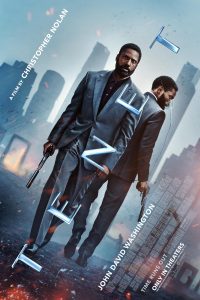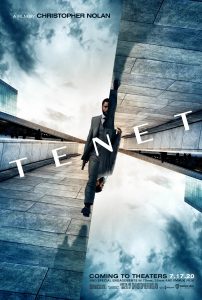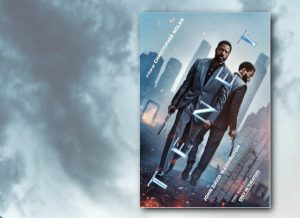TENET directed by Christopher Nolan (FILM REVIEW)
As our first post-lockdown cinema trip, Tenet certainly offered plenty of flash bang entertainment, but beneath the muscular action sequences lies an intricately twisted plot that is sure to make the film a fortune in second viewings or streaming downloads, with viewers hitting pause and rewind and play, all to try and work out “What the hell just happened there?”
The Story
 There have been some great speculative fiction films that really mess with the audience’s concept of time, for example Timecop (1994), Arrival (2016), or perhaps more relevantly Déjà Vu (2006). In the latter film Denzel Washington plays an AFT agent investigating a terrorist attack with the aid of a new-fangled cunning surveillance technique. As the plot unravels (or ravels depending on your perspective) Washington gets a chance not just to see what happened in the past but to intervene in it. The second part of that film addresses the opening part’s enigmas with all the satisfying neatness of a quantum handshake (in the transactional interpretation of quantum mechanics).
There have been some great speculative fiction films that really mess with the audience’s concept of time, for example Timecop (1994), Arrival (2016), or perhaps more relevantly Déjà Vu (2006). In the latter film Denzel Washington plays an AFT agent investigating a terrorist attack with the aid of a new-fangled cunning surveillance technique. As the plot unravels (or ravels depending on your perspective) Washington gets a chance not just to see what happened in the past but to intervene in it. The second part of that film addresses the opening part’s enigmas with all the satisfying neatness of a quantum handshake (in the transactional interpretation of quantum mechanics).
The déjà vu like resonances between Tenet and er… Déjà Vu are somewhat accentuated by the fact that Tenet’s star John David Washington is the eldest son of Déjà Vu’s lead, Denzel Washington. However, Tenet takes the complexity of playing with conventional narrative directions (the arrow of time, if you like) to a new level.
It does make for a potentially confusing story and there are points where you just have to allow yourself to be swept along by the current of events, most notably in the opening sequence where a never-named CIA agent played by Washington seems to be embroiled in a terrorist incident at a Russian Opera house. That is definitely one part of the film that I need to re-watch. However, things seem to straighten out a bit (well as much as they ever do in this loopingly tortuous plot) after a bizarre and rather shocking rail-side interrogation.
The cinematography
Nolan plucks some beautiful images from around the world, Naples, Vietnam, a lonely wind farm at sea, an affluent yacht, the crowded streets and towering homes of Mumbai. In an age of digital enhancement it can be hard to be sure how much of what we see is real, how much a digital artefact drawn on a green-screen, but both the colourful images and the gritty action sequences are utterly convincing.
The film purports to be a spy movie and there is certainly a James Bond element to Washington’s globe-trotting spy for unknown masters chasing down pieces of the puzzle in exotic locations from Sweden to India. There are also elements of a war movie as our heroes weave back and forth across a grey battleground as evocative of the grim business of battle as Dunkirk. There is also a motorway action scene fraught with Tenet’s particular brand of excitement and hazard, in its way as memorable as the one in The Matrix Reloaded (2003), and also featuring the best use of a fire-engine in a chase scene since Terminator 2: Judgement Day (1991).
The Acting
 While the action sweeps you along, it does not swamp the acting.
While the action sweeps you along, it does not swamp the acting.
Washington is a convincing protagonist, credibly empathetic, impressive as the kick-ass action hero and full of sang-froid in the cut and thrust of repartee with a variety of villains.
Pattinson makes a great foil, while Debicki plays the tormented wife and frightened mother with impressively tight-lipped emotion. There is one instant where I thought, “Ah – that’s why the film needed someone very tall in this role” but Debicki makes full use of the agency that the film’s script gives her and commands every scene she is in.
Kapadia also delivers a strong performance as the enigmatic arms trader and go-between, though I found Michael Caine’s cameo a little disappointing – I don’t feel he has quite carried his screen presence into his ninth decade (the man is 87 after all) as well as, say, Christopher Lee did.
For me though, the standout actor was Kenneth Branagh for the simple reason that I didn’t realise it was him until I was looking through the cast list after seeing the film. I am always impressed by actors who can inhabit their roles so completely that they elide my awareness of who they are, or even that they are acting. A brooding and malevolent presence at the centre of the maelstrom that is sucking the other characters in.
Conclusion
The word “algorithm” has been bandied about quite a bit in the last few weeks of news, but the use of the term in Tenet breaks new ground and turns something abstract into an object of concrete menace. As Washington and Pattinson gather their allies for the story’s geographically separated but temporally simultaneous climaxes, I found this thoroughly enjoyable sci-fi, spy-fi, action war thriller had one more resonance for me – the poignant touch of A Time Traveller’s Wife, or the tale of Dr Who and Alex Kingston’s River Song character.
When Washington’s protagonist started talking early on about entropy and time’s arrow I did think, “Hey ho, the science is going to annoy me” but in the end it utterly absorbed me. Somewhere I am sure there must be some three-dimensional diagram of the plot with a cat’s cradle of storylines. And the weave is so intricate it would take a more forensic re-examination than mine to spot any plot holes. If Denzel Washington’s Déjà Vu was the Special Relativity of mess-with-time-movies, then John David Washington’s Tenet is the General Relativity of the genre. I don’t re-watch movies or re-read books very often, but this is one film I will be catching again. It is definitely a movie that needs to be experienced twice which… in the circumstances, is fittingly ironic.

